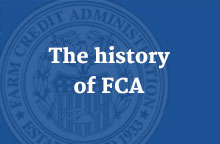History of FCA governance
FCA was created in 1933 by executive order of President Franklin D. Roosevelt. In its early years, the agency was headed by a governor who reported directly to the president. Then, in 1939, President Roosevelt issued an executive order ending FCA’s independent status and placing the agency in the U.S. Department of Agriculture (USDA).
Shortly after this, a bill was introduced that sought to change the structure of the federal land bank system from stock cooperatives to membership cooperatives, with no monetary contribution by the farmer-borrowers. This would have made the Farm Credit System (FCS) another government lending program “owned” by USDA, not by the farmers.
The bill did not pass, but these actions to change the FCS made many farmers and farm organizations determined to achieve an independent FCA led by a board whose members came from the FCS (although appointed by the president). Their goal was to empower grassroots forces and weaken political influence. Consequently, the federal land banks made a concerted effort to pay off their government capital. By 1947, they had done just that.
In 1953, 14 years after the agency had been placed under the control of USDA, Congress passed the Farm Credit Act of 1953, which restored FCA as an independent agency. This legislation created a part-time, 13-member Federal Farm Credit Board with the power to appoint a governor to administer its policies.
During the agricultural credit crisis of the 1980s, Congress passed the Farm Credit Amendments Act of 1985, which abolished the Federal Farm Credit Board and established the full-time, three-member, presidentially appointed board structure that FCA has today.
View current FCA board members
-
- Henry Morgenthau Jr.
- William I. Myers
- Forrest F. Hill
- Albert G. Black
- Ivy Duggan
- Carl R. Arnold
- Robert B. Tootell
- Edwin A. Jaenke
- W. Malcolm Harding
- Donald E. Wilkinson
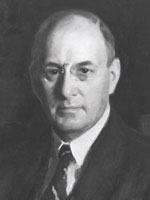 Henry Morgenthau Jr.
Henry Morgenthau Jr.
Chairman, Federal Farm Board
March 26 to May 26, 1933
Governor, Farm Credit Administration
May 27 to November 16, 1933Henry Morgenthau Jr. was the first governor of FCA. He was appointed chairman of the Federal Farm Board by his long-time friend and neighbor, Franklin D. Roosevelt, soon after Mr. Roosevelt’s inauguration to the presidency on March 4, 1933. Mr. Morgenthau became governor of the Farm Credit Administration upon the effective date of the executive order establishing FCA.
Before beginning his career with FCA, Mr. Morgenthau had served under Mr. Roosevelt when Mr. Roosevelt had been governor of New York — first as chairman of the New York State Agricultural Advisory Commission in 1929 and then as state commissioner of conservation in 1930. In his role as a key advisor to the new president on the farm crisis, he was tasked with abolishing the Federal Farm Board and establishing an independent farm credit agency that would consolidate the various agricultural credit agencies.
He also was charged with ameliorating the financial problems of farmers, who were losing their farms during the Depression at an alarming rate. To accomplish those objectives, he brought William I. Myers of Cornell University to Washington to advise him and to write the executive order establishing the Farm Credit Administration, as well as the legislation authorizing it — the Farm Credit Act.
Mr. Morgenthau served at FCA until later in 1933, when the president appointed him acting and under secretary of the Treasury. In 1934, he was named secretary of the Treasury after Secretary William Woodin’s ill health forced him to resign. Mr. Morgenthau remained in that role for 11 years.
He is credited with stabilizing the U.S. currency during the pre-World War II years, financing the war effort with his successful program to sell $200 billion of war bonds, and financing the new Social Security program with a separate tax rather than with general revenues. He also played a leading role at the Bretton Woods Conference in 1944 to establish the international banking system after World War II. The conference set up the International Monetary Fund and the International Bank for Reconstruction and Development (the World Bank).
Born in 1891, Mr. Morgenthau studied agriculture and architecture at Cornell University. When he was quite young, he bought a large farm in Dutchess County, New York, and specialized in dairy farming and apple growing. During World War I, he worked with Herbert Hoover in the U.S. Farm Administration to send tractors to France. From 1922 to 1933, he was publisher of what became the leading national weekly on agriculture, The American Agriculturalist.
After leaving the Treasury Department, Mr. Morgenthau served as chairman of the United Jewish Appeal (1947–50), helping to raise $465 million, and as chairman of the board of governors of the American Financial and Development Corporation for Israel (1951–54), handling a $500 million bond issue for the new country.
Mr. Morgenthau died on February 6, 1967.
Read Henry Morgenthau Jr.'s diary dated April 27, 1933, to Nov. 16, 1933, in which he documented his brief tenure as the Farm Credit Administration's first governor.
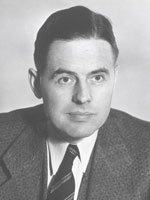 William I. (Bill) Myers
William I. (Bill) Myers
Governor
November 17, 1933, to September 20, 1938William (Bill) Myers was the first deputy governor of FCA and succeeded Henry Morgenthau Jr. to become the agency’s second governor. Mr. Myers came to Washington with Mr. Morgenthau in 1932 as his technical advisor on reorganizing the farm credit system established in 1916, which was undercapitalized and struggling to pay the interest on the capital it had borrowed.
Mr. Myers’s task was to write the executive and legislative documents to revitalize the system. Together with Rep. Marvin Jones, chairman of the House Committee on Agriculture, he wrote the executive order consolidating all agricultural credit agencies and named the new agency the Farm Credit Administration.
The two men also wrote two pieces of legislation — the Farm Credit Act of 1933, which implemented FCA and established the Farm Credit System (FCS), and the Emergency Farm Mortgage Act of 1933, which provided emergency financing to farmers at risk of losing their farms. For those accomplishments as well as those in his nearly five years as governor, Mr. Myers is credited with being the principal architect of the FCS.
Mr. Myers was exceptionally well qualified to address the agricultural credit crisis of the Depression years. He had earned bachelor’s and doctoral degrees from the agriculture college at Cornell University, where he taught farm management and finance. His vision was for a separate, reliable source of credit to meet the needs of farmers, not one geared toward business and industry.
Mr. Myers also wanted the FCS to eventually be free of the government subsidies that were capitalizing the new system and reducing interest rates, and to be owned by the farmer-borrowers themselves. In his address to the 1936 annual meeting of the American Farm Bureau Federation, Mr. Myers asked the federation to not request Congress to continue the subsidized interest rate on land bank loans, noting that the FCS was a cooperative organization that should stand on its own as quickly as possible.
Mr. Myers’s personal and professional abilities earned him the respect of those in government, as well as those who worked in the district banks and associations across the country and the leaders of the national farm organizations. Mr. Myers was determined to build a strong, efficient system by choosing and training the most qualified people regardless of their political persuasion as officers of the federal land banks, production credit associations, and banks for cooperatives.
The FCS grew rapidly to fill the void as other agricultural lenders left the market, processing 500,000 loans valued at $1.25 billion in 1934. At a time when most new organizations in government were highly affected by political considerations, Mr. Myers kept FCA focused on the job of helping farmers help themselves.
Mr. Myers left FCA in 1938 to return to Cornell to lead its Department of Agricultural Economics. From 1943 to 1959 he was dean of the New York State College of Agriculture and Life Sciences at Cornell. During those years, he served on numerous committees and commissions, including the following:
- President Franklin D. Roosevelt’s Committee on Farm Tenancy
- The American Institute of Cooperation
- The New York State Commission on Agriculture
- President Harry S Truman’s Famine Emergency Committee
- The Committee on Foreign Aid (which, under the leadership of Secretary of Commerce W. Averell Harriman, made recommendations that led to the Marshall Plan to rehabilitate Europe)
- The New York State Food Commission
- The National Agricultural Advisory Commission
- The President’s National Agricultural Advisory Council, to which he was appointed by President Dwight Eisenhower to serve as its first chairman
His broad interests in education resulted in Myers’s serving for many years as a trustee of the Rockefeller Foundation, the General Education Board, the Carnegie Institution of Washington, the Eisenhower Exchange Fellowships, the Agricultural Development Council, Elmira College, and Vassar College.
He traveled as a consultant to the Philippines and India for Cornell University and the Ford Foundation. For five years, he served on the International Development Advisory Board of the International Cooperation Administration.
Mr. Myers served on the boards of directors of many large businesses, as well as of several farmers cooperatives. For 12 years, he served on the board of directors and was deputy chairman of the Federal Reserve Bank of New York.
He was honored with many awards by farmers groups, including induction in 1976 into the Cooperative Hall of Fame, which honors men and women who have made “genuinely heroic contributions to the enhancement of cooperative enterprise and to the advancement of the principles of cooperation.” After he died in January 1976, he was memorialized with an endowed faculty chair, the William I. Myers Professorship of Agricultural Finance, at Cornell’s agricultural college in 1979.
 Forrest F. “Frosty” Hill
Forrest F. “Frosty” Hill
Governor
September 21, 1938, to March 26, 1940Forrest Hill was the third governor of FCA. He came to Washington in 1934 from a teaching position at Cornell University at the request of his predecessor and Ph.D. advisor, William I. Myers. He was tasked with organizing the production credit associations and later became Myers’s deputy governor in charge of finance and research. During a time when loan volume in the Farm Credit System was high and the FCS was integrating many new employees, the two men were credited with ensuring high standards in FCS institutions across the country.
When Mr. Myers returned to Cornell, he recommended to President Franklin D. Roosevelt that Mr. Hill replace him as governor. Mr. Hill served for one-and-a-half years before resigning after a dispute with Secretary of Agriculture Henry A. Wallace over the autonomy of FCA. Mr. Hill, as had Mr. Myers before him, wanted to keep FCA independent, reporting only to Congress and the president.
Secretary Wallace wanted to bring it under the management of the U.S. Department of Agriculture (USDA). In 1939, by executive order of President Franklin D. Roosevelt, FCA did become part of USDA, only regaining its independent status years later under the Farm Credit Act of 1953.
At the time Mr. Hill left FCA, the FCS had a portfolio of loans valued at more than $5 billion. After leaving FCA, Mr. Hill returned to Cornell in 1940, serving for 15 years as a professor of land economics, as chairman of the Department of Agricultural Economics, and as provost of the university. Frustrated with a lack of funding to improve the status of the faculty, he resigned in 1955 to become the vice president of overseas development for the Ford Foundation.
Working in developing countries and in partnership with J. George Harrar, president of the Rockefeller Foundation, he helped establish international research centers, such as the International Rice Research Institute (IRRI) in the Philippines and the International Maize and Wheat Improvement Center in Mexico. He also worked to increase agricultural yields and cofounded the Consultative Group on International Agricultural Research. From 1963 to 1978 he was chairman of the board of IRRI; he also served as president of the American Agricultural Economics Association. Mr. Hill considered his work with international research groups to solve world food problems the most satisfying of his career.
Mr. Hill is memorialized at Cornell University through the “Frosty” Hill Agricultural Research Fellowship in honor of his significant contributions to the application of agricultural sciences in addressing critical world food problems.
 Albert G. Black
Albert G. Black
Governor
March 27, 1940, to June 21, 1944Albert G. Black was the fourth governor of FCA. Less than a year before his appointment, FCA had been put under the control of the U.S. Department of Agriculture by executive order of President Franklin D. Roosevelt. Mr. Black came from USDA, where he had been the director of marketing and regulation in the Agricultural Adjustment Administration and, before that, the director of the Bureau of Agricultural Economics.
At the beginning of Mr. Black’s term, he, along with Agriculture Secretary Henry A. Wallace, sought to change the structure of the federal land bank system from stock cooperatives to membership cooperatives, with no monetary contribution by the farmer-borrowers. The government would guarantee the bonds the land banks sold to raise money for loan capital.
This plan, embodied in the Wheeler-Jones bill, would have made the Farm Credit System another government lending program controlled by USDA, not by the farmers. Although the bill did not pass, these actions to change the FCS made many farm organizations and farmers determined to achieve an independent FCA led by a board whose members came from the FCS (although appointed by the president).
Consequently, by the last year of Mr. Black’s service, the Federal land banks started to make a concerted effort to pay off their government capital. Most achieved this by 1946, and by 1947, all capital had been repaid. At the same time, the production credit associations (PCAs) mounted successful campaigns to encourage farmer-borrowers to buy Class A nonvoting stock in addition to the Class B stock they were required to buy when they took out loans. By 1944, the first PCA became completely farmer owned.
Also during Mr. Black’s tenure, which coincided with the years of World War II, farm prices and the value of farmland rose along with the demand for food for the troops. The governor, concerned that the wartime boom in land prices would lead to a devastating decline as it had after World War I, mounted a publicity campaign urging farmers not to get overextended by paying too much for farmland. The feared bust in land prices did not occur, however, and farmers’ increased income allowed them to substantially reduce their farm mortgage debts, as FCA had urged. Total mortgage debt fell from $12 billion in 1940 to $8 billion in 1945. The trend toward more prosperous times for farmers and the FCS continued through the 1970s.
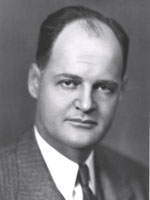 Ivy W. Duggan
Ivy W. Duggan
Governor
June 22, 1944, to June 30, 1953Ivy W. Duggan was governor of FCA when it was an agency in the U.S. Department of Agriculture. He had served as deputy governor for a year before his appointment. During his term, the 12 federal land banks and 281 of the 499 production credit associations became completely farmer owned, having paid back the last of the government capital that established them.
He resigned from FCA in 1953 to become vice president of the Trust Company of Georgia.
Mr. Duggan started his government career as an economist with the Agricultural Adjustment Administration in 1934, becoming director of its southern division in 1937. Before that position, he was a professor of agricultural economics at Clemson College and at Mississippi State College. In Georgia, he had taught vocational agriculture and then became a county agricultural agent.
Mr. Duggan earned a bachelor’s degree from Clemson College and a master’s degree in rural economics from The Ohio State University. In 1937, Clemson College conferred an honorary doctorate upon Mr. Duggan in recognition of his outstanding work in agriculture. Other honors were the Honorary State Farmers degree from the State Farmers of Mississippi, and the Honorary Farmers degree from the Future Farmers of America. He died in January 1986.
 Carl R. (Cap) Arnold
Carl R. (Cap) Arnold
Governor
July 16, 1953, to March 31, 1954Carl R. Arnold succeeded Ivy W. Duggan as governor after having served FCA as its second production credit commissioner from 1938 to 1951. A fervent believer in democratic control for the production credit associations (PCAs) and all levels of the Farm Credit System, he put much effort into training farmers to operate their local PCAs and other cooperatives.
Mr. Arnold especially pushed the PCAs to pay back their government capital in order to become wholly owned by their farmer-borrowers. At the time he took office as governor, all the federal land banks and more than half of the PCAs had paid back their government capital.
The Farm Credit Act of 1953 removed FCA from its home in the U.S. Department of Agriculture and restored it as an independent federal agency, effective December 1953. As governor, Mr. Arnold was integral to setting up the procedure for nominations for, and appointments to, the new Federal Farm Credit Board, which would lead the agency until its governance structure changed in 1986. Mr. Arnold was the board’s choice for its first appointed governor, but he declined for health reasons. He did serve as acting governor, however, until Robert B. Tootell was appointed.
Mr. Arnold was an extension economist with The Ohio State University before he began his service with FCA.
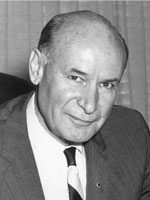 Robert B. Tootell
Robert B. Tootell
Governor
April 1, 1954, to February 28, 1969Robert B. Tootell was the first governor appointed by the new Federal Farm Credit Board, a post he held for 15 years and through four presidential administrations.
During Mr. Tootell’s tenure and as a result of policies adopted by the board, the Farm Credit System (FCS) grew rapidly, quadrupling in net worth. By 1968, it was serving about 725,000 members, up from 517,000 members 15 years before.
The crowning achievement of Mr. Tootell’s career was when the FCS paid back all government capital by the end of 1968 and became completely owned by its farmer-borrowers. This milestone enabled the Federal Farm Credit Board to appoint future governors without presidential approval, thus helping to separate the FCS from political considerations.
Before his service as governor, Mr. Tootell had been chief reviewing appraiser at the Federal Land Bank of Spokane and on the appraisal staff of FCA. He then became head of the Department of Agricultural Economics and, later, director of the Agricultural Extension Service at Montana State College, from which he had graduated. Later, he became director of the Washington State College Agricultural Extension Service.
Internationally recognized as an agricultural expert, Mr. Tootell served as a consultant overseas on several short-term assignments. Shortly before he left FCA, he received a Distinguished Service Award by the nation’s farm magazine editors. Mr. Tootell died on August 20, 1971.
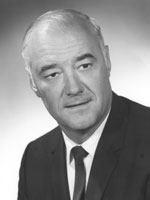 Edwin A. Jaenke
Edwin A. Jaenke
Governor
March 1, 1969, to October 31, 1974Mr. Jaenke, at age 38 when he assumed the governor’s position, was the youngest person to hold this office. His focus and major accomplishment as governor was to recognize the need to broaden the authority of the Farm Credit System to meet the demands and challenges of modern agriculture and rural residents. The Commission on Agricultural Credit, formed in 1969 by the Federal Farm Credit Board at Mr. Jaenke’s recommendation, came up with 12 objectives for the System. Some of these objectives were to ensure credit for young farmers; for certain farm-related businesses necessary for agricultural production, processing, and marketing; and for the development of rural America, including nonfarm rural homes, rural utility systems, and other community needs.
These objectives assumed a broader view of the needs of farmers. They consequently were included in the Farm Credit Act of 1971 (or later amendments), which expanded the System’s ability to serve farmers, ranchers, their cooperatives, and rural Americans, including nonfarming families. Commercial fishermen also became eligible for System loans in the Act.
During Mr. Jaenke’s tenure, the System served more farmers and ranchers than ever before. Loan volume increased from $10 billion in 1969 to $26 billion in 1974. Total net worth of the System grew from $2 billion to more than $3 billion.
Mr. Jaenke came to Washington in 1957 from Missouri, where he had been an instructor and research assistant at the University of Missouri, to work as an agricultural economist for Senator Stuart Symington (D-Mo.). He then worked for the Department of Agriculture as deputy administrator of the Agricultural Stabilization and Conservation Service and as vice president of the Commodity Credit Corporation. During this period, in 1966, he was given the Arthur S. Flemming Award, which honors outstanding federal employees. He was an important figure in the creation and privatization of the National Cooperative Bank, which builds and finances consumer cooperatives. For this and his other accomplishments in the service of the cooperative movement, he was inducted in 1986 into the Cooperative Hall of Fame.
Mr. Jaenke earned a bachelor’s degree in agriculture at the University of Illinois and a master’s degree in agricultural economics at the University of Missouri. He served in the U.S. Navy between his degree programs and has international experience as a delegate on various councils. After his tenure at FCA, Mr. Jaenke started E.A. Jaenke & Associates, an agricultural consulting firm.
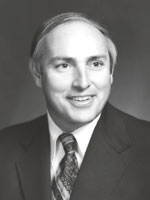 W. Malcolm Harding
W. Malcolm Harding
Governor
November 1, 1974, to February 28, 1977W. Malcolm Harding was appointed governor of FCA by the Federal Farm Credit Board.
Before becoming governor, Mr. Harding served for nearly two years as deputy governor and director of credit service for FCA. In this role, he coordinated the extension of credit by the banks and associations of the Farm Credit System and assisted them in developing loan, appraisal, and credit standards.
Mr. Harding spent nearly his entire adult life serving the credit needs of farmers, beginning in 1958 when he was named assistant manager of the Federal Land Bank Association of Winston-Salem, North Carolina. After three years, he moved to the Federal Land Bank of Columbia (South Carolina) as a credit analyst. He advanced to increasingly responsible positions in the bank and in 1967 became vice president for credit and appraisal. In 1972, he was named vice president for credit for the Federal Intermediate Credit Bank of Columbia.
He finished his service with FCA when he retired in 1993 as chief executive officer of the Central Bank for Cooperatives (CoBank). He had been a leader in consolidating 11 banks for cooperatives to form CoBank. Then, as CEO, he led the effort to create an international banking program to help U.S. farm cooperatives sell in world markets.
Mr. Harding was inducted into the Cooperative Hall of Fame in 1997, which honors men and women who have made “genuinely heroic contributions to the enhancement of cooperative enterprise and to the advancement of the principles of cooperation.” He joined previous FCA Governors William I. Myers and Edwin A. Jaenke in receiving that award. He was also honored with a scholarship in his name at Oklahoma State University, sponsored by the National Council of Farmer Cooperatives Education Foundation to encourage students to pursue education on cooperative topics.
A native of Yadkinville, North Carolina, Mr. Harding earned an A.B. from the University of North Carolina and taught in the Davidson County school system. Following two years’ service in the U.S. Army, Mr. Harding worked on his family’s farm until accepting his first assignment with the Farm Credit System.
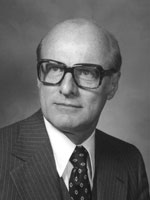 Donald E. Wilkinson
Donald E. Wilkinson
Governor
Acting Chairman
March 1, 1977, to March 28, 1986Donald E. Wilkinson was the last governor of FCA. The agency’s governing structure was changed in the Farm Credit Amendments Act of 1985 to a three-person, presidentially appointed board. When the Act became effective on January 23, 1986, he was named acting chairman.
Mr. Wilkinson served during the agricultural crisis of the 1980s, which saw high interest rates to stem rising inflation, lower prices for farm commodities, and therefore lower incomes for farmers, which prevented or hindered them from repaying their loans. The Farm Credit System itself suffered losses greater than those it had seen during the Depression.
Mr. Wilkinson brought to his position extensive experience and education in agriculture. Before becoming governor, Mr. Wilkinson served one-and-a-half years as administrator of the Agricultural Marketing Service, an agency of the U.S. Department of Agriculture (USDA). Before that position, he was secretary of the Wisconsin Department of Agriculture from 1969 to 1975. He began his career there in 1948 and held various positions, including chief of the marketing division and assistant secretary.
Mr. Wilkinson was an active member of various agricultural organizations and served as president of two associations: the National Association of State Departments of Agriculture (1973–74) and the National Association of Marketing Officials (1964). He also served on USDA’s Marketing Advisory Committee (1969–75) and the Federal Energy Office’s Agricultural Advisory Committee (1974).
Among the honors Mr. Wilkinson received are the following:
- A Joint Resolution for Distinguished Achievement by the Wisconsin legislature
- A Commendation for Distinguished Service by the Governor of Wisconsin
- An Honorary American Farmer degree from the Future Farmers of America
- The award for Executive of the Year by SME–Madison, a professional organization of sales and marketing executives, in 1974
A native of Benton, Wisconsin, Mr. Wilkinson earned degrees in agricultural economics and agricultural education from the University of Wisconsin in Madison. During World War II, he served in the Army Air Corps as a B-29 Superfortress pilot, with combat duty in the Pacific Theater.
-
- Kenneth J. Auberger
- Frank W. Naylor Jr.
- Marvin Duncan
- Jim R. Billington
- Harold B. Steele
- Billy Ross Brown
- Gary C. Byrne
- Doyle L. Cook
- Marsha Pyle Martin
- Ann Jorgensen
- Michael M. Reyna
- Michael V. Dunn
- Douglas L. Flory
- Nancy C. Pellett
- Dallas P. Tonsager
- Leland A. Strom
- Jill Long Thompson
- Kenneth A. Spearman
- Dallas P. Tonsager
- Vincent G. Logan
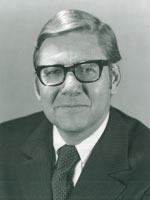 Kenneth J. Auberger
Kenneth J. Auberger
Acting Chairman
March 29 to May 21, 1986Kenneth Auberger succeeded Donald E. Wilkinson as Acting Chairman shortly after the Farm Credit Amendments Act of 1985 became effective and before the first Board Chairman, Frank W. Naylor Jr., took office. The Act had changed the governing structure of FCA to a three-person presidentially appointed Board, with one member serving as Chairman and Chief Executive Officer.
Mr. Auberger had a long career with FCA. He started his career with FCA in April 1964 as Assistant Chief Examiner. He was appointed Chief Examiner in January 1966 and then Deputy Governor in November 1975. In June 1982, he was named Deputy Governor and Chief of Staff, a position he held until December 1984, when he was named Executive Assistant to the Governor. From August 1978 to December 1985, he also served as Secretary to the Federal Farm Credit Board. He became Acting Director of the Office of Administration from June to September 1986 and then served the new FCA Board as Secretary.
Before joining FCA, he worked for 12 years for the U.S. General Accounting Office, becoming supervisory accountant in 1961. Before entering Government service, he was an accountant for Carl D. Thomy & Company in Rochester, New York, from 1950 to 1951.
Mr. Auberger earned a bachelor’s degree in business administration from Siena College and a doctorate of law and a master of business administration from American University.
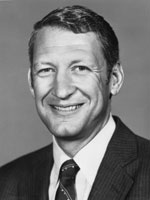 Frank W. Naylor Jr.
Frank W. Naylor Jr.
Chairman and Chief Executive Officer
May 22, 1986, to November 11, 1988Frank Naylor was appointed to a six-year term on the FCA Board by President Ronald Reagan and was designated Chairman and Chief Executive Officer.
He was the first Chairman after the Farm Credit Amendments Act of 1985 provided for a full-time, presidentially appointed Board of Directors. The Act also granted increased enforcement powers and greater oversight authority to FCA to help Farm Credit System (FCS) institutions recover from the steep financial losses of the 1980s. This new authority focused Mr. Naylor’s efforts, along with those of the other Board members, on promulgating regulations to restore financial health and stability to the FCS. A highlight of his tenure was the Board’s approval of borrower rights regulations for FCS institutions.
In the five years before his appointment to the FCA Board, Mr. Naylor served as Under Secretary of Agriculture for Small Community and Rural Development. In that role, he supervised the Farmers Home Administration; the Rural Electrification Administration, including the Rural Telephone Bank; and the Federal Crop Insurance Corporation.
He was a member of the Commodity Credit Corporation Board of Directors and served as the U.S. Department of Agriculture’s (USDA’s) representative on financial and housing working groups for the Cabinet Council on Economic Affairs.
From 1976 until 1981, Mr. Naylor was senior vice president of the 11th Farm Credit District, Sacramento, California. From 1973 to 1976, Mr. Naylor was Associate Administrator and Administrator of the Farmers Home Administration, where he managed a nationwide rural credit operation, including agricultural, mortgage, farm, and community development loans.
In 1972, he was Executive Assistant to the Administrator at the Veterans Administration, where he developed management alternatives for the delivery of improved medical services and other benefits to veterans. Before that, Mr. Naylor was Deputy Administrator of the Federal Crop Insurance Corporation at USDA.
Following his service with FCA, Mr. Naylor became president and chief executive officer of U.S. Agricredit, Inc., a diversified financial services company.
A native of Kansas, Mr. Naylor graduated from the University of Kansas, Lawrence. He saw combat duty in Vietnam, was awarded the Navy Commendation Medal, and was a national chairman of the Vietnam Veterans Committee.
 Marvin Duncan
Marvin Duncan
Acting Chairman and Chief Executive Officer
November 12, 1988, to October 9, 1989
Member
May 22, 1986, to November 11, 1988
October 10, 1989, to September 18, 1990Marvin Duncan was appointed to the FCA Board for a four-year term by President Ronald Reagan on May 22, 1986. From November 12, 1988, to October 9, 1989, he served as Acting Chairman and Chief Executive Officer after Frank W. Naylor resigned. He resigned his position as a member of the board on September 18, 1990.
Before his appointment, he had served as FCA’s Senior Deputy Governor. His responsibilities included directing strategic planning and representing FCA to the administration, Congress, other financial institutions, the Farm Credit System, and the public.
Before joining FCA, Mr. Duncan was a vice president and senior economist with the Federal Reserve Bank of Kansas City, where he led the regional economics group in the Economic Research Department and was responsible for directing research in agriculture, energy, and regional economics. He joined the bank in 1975 as an agricultural economist and was appointed to the official staff in 1979. Before joining the Federal Reserve, Mr. Duncan spent 15 years in farm management and agribusiness and served on the faculties of North Dakota State University and Iowa State University.
Mr. Duncan is now senior agricultural economist in the Office of Energy Policy and New Uses, Office of the Chief Economist, U.S. Department of Agriculture. He writes and speaks extensively on economic and farm topics. He was chairman of the National Planning Association’s Food and Agriculture Committee and was a member of USDA’s National Agricultural Cost of Production Standards Review Board.
Mr. Duncan holds bachelor’s and master’s degrees from North Dakota State University and a doctorate in agricultural economics from Iowa State University.
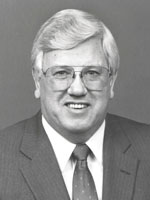 Jim R. Billington
Jim R. Billington
Member
October 14, 1986, to January 6, 1989Jim Billington was appointed by President Ronald Reagan to the FCA board for a two-year term and was reappointed to a six-year term in 1988. He resigned in January 1989 to become chief executive officer of the Minnesota Wheat Research and Promotion Council and the Minnesota Wheat Growers.
From 1978 on, he was a full-time farmer and rancher in Altus, Oklahoma. He was president of the National Association of Wheat Growers in 1981, after serving as secretary in 1979 and as vice president in 1980. Mr. Billington also served as president of the Oklahoma Wheat Growers’ Association and was a member of the Federal Grain Inspection Advisory Board, an appointment made by the secretary of agriculture.
Before turning to full-time farming, he was president and chief executive officer of the First National Bank of Beaver, Oklahoma, from 1975 to 1978. Mr. Billington worked for the Farm Credit System for nearly 10 years, first as an examiner with the Federal Intermediate Credit Bank of Wichita and then as president and chief executive officer of the Woodward Production Credit Association in Woodward, Oklahoma, from 1967 to 1975.
Before that, Mr. Billington was a farm advisor with the University of California and superintendent of the Irrigation Research Station at Oklahoma State University.
Mr. Billington earned both bachelor’s and master’s degrees at Oklahoma State University.
 Harold B. Steele
Harold B. Steele
Chairman and Chief Executive Officer
October 10, 1989, to September 8, 1993Harold Steele was appointed to the FCA board by President George H. W. Bush to fill the remainder of Frank Naylor’s term. At the same time, he was designated chairman. After the expiration of his first term, he continued to serve as chairman for another 15 months.
His accomplishments at FCA include the introduction of various managerial tools and procedures. He also set up annual meetings between FCA staff and association management to improve communications with FCS institutions.
Mr. Steele is from Princeton, Illinois, where his family’s farm of 1,000 acres produces corn, soybeans, and pork. He was a member of the board of directors of the Midwest Financial Group, Inc., a holding company comprising 19 member banks in northern Illinois. He also served on the boards of the Agrarian Management Corporation in Chicago, the Illinois Society of Scientific Surveys in Springfield, and the Illinois Agricultural Leadership Foundation in Macomb.
Mr. Steele served as chairman of the presidentially and congressionally appointed National Commission on Agricultural Finance, which was created by the Farm Credit Amendments Act of 1985 and which made its report to Congress on February 22, 1989.
From 1975 to 1982, he served on the board of directors of the National Livestock Producers Association, and from 1977 to 1979 on the National Livestock and Meat Board. From 1970 to 1983, Mr. Steele served as the full-time president of the Illinois Farm Bureau (IFB), the state’s largest general farm organization with 315,000 member families. During that period he served as president of the IFB-affiliated group of insurance companies and investment firms. He also served on the board of the American Farm Bureau Federation from 1971 to 1983 and was a member of its executive committee in 1981 and 1982. While serving as IFB president, he traveled on agricultural trade missions throughout Western Europe; Eastern Europe, including the former Soviet Union; Japan; and the People’s Republic of China.
As an agricultural producer and leader, Mr. Steele received many awards and honors:
- Outstanding Young Farmer in Illinois Award from the Jaycees (1956)
- Master Farmer Award by "Prairie Farmer" magazine (1970)
- Land of Lincoln Award from the Illinois Pork Producers Association (1972)
- University of Illinois Distinguished Service Award (1984)
In addition, he was elected a laureate of the Lincoln Academy of Illinois, an organization that honors the achievements of distinguished Illinoisans, in 1999, and he is an honorary lifetime member of the Illinois Association of Vocational Agriculture Teachers.
Mr. Steele attended the University of Illinois’ College of Agriculture before entering World War II as a U.S. Army captain. His decorations include the Silver Star, Purple Heart, Army Commendation Medal, and European Theater of Operations Medal with two battle stars.
 Billy Ross Brown
Billy Ross Brown
Chairman and Chief Executive Officer
August 31, 1993, to October 17, 1994
Member
October 30, 1990, to August 30, 1993Billy Ross Brown was appointed by President George H. W. Bush to the FCA board to fill the unexpired term of Jim R. Billington. He was designated chairman and chief executive officer on August 31, 1993, by President William J. Clinton.
He also served as the first chairman of the Farm Credit System Insurance Corporation, making him the first board member to serve in both capacities (although not at the same time).
Mr. Brown came to FCA with many years of experience with the Farm Credit System. He started as a member of the board of directors of the Oxford (Mississippi) Production Credit Association (PCA) in 1969, serving as chairman from 1976 to 1985. From 1985 to 1990, he served as a board member of the First South PCA in Jackson, Mississippi.
After he left the FCA board in 1994, he returned to Oxford, where he was nominated to serve again on the First South board. That time, he served from June 1999 until his mandatory retirement in March 2005. Throughout, he continued to run his timber operation in Oxford.
Mr. Brown had long been active in state and national agriculture and conservation organizations. He was area vice president for the Mississippi Association of Conservation Districts for more than 20 years and a commissioner of the Lafayette County Soil and Water Conservation District for more than 30 years. He also served as chairman of the Mississippi Soil and Water Conservation Commission from 1982 to 1986. From 1976 to 1979, he was a member of the U.S. Forest Service’s National Advisory Committee.
In recognition of his work in conservation, forestry, wildlife, and agriculture, Mr. Brown received a number of national and state awards:
- In 1982 and 1988, he received the Presidential Award from the Mississippi Association of Conservation Districts.
- In 1985, he was selected as a member of the Hall of Fame by the Mississippi Agriculture and Forestry Museum.
- In 1976, he received the U.S. Forest Service 75th Anniversary Award for significant contributions to forestry and conservation.
Mr. Brown served in both the U.S. Army and the Mississippi National Guard, where he led a unit to protect James Meredith, the first black student admitted to the University of Mississippi, and the university during an all-night riot on September 30, 1962. He himself is a graduate of the University of Mississippi, where he earned a bachelor’s degree in business administration.
 Gary C. Byrne
Gary C. Byrne
Member
December 2, 1991, to March 31, 1995Gary Byrne was appointed to the FCA board by President George H. W. Bush to fill the unexpired term of Marvin Duncan. Mr. Byrne was elected to also serve as chairman of the board of the Farm Credit System Insurance Corporation on June 11, 1992.
Before his appointment to these positions, he served as the administrator of the Rural Electrification Administration in the U.S. Department of Agriculture (USDA). As administrator, he managed an agency that approved more than $62 billion in loans to 2,116 rural electric and telephone utilities in 47 States, Guam, the Federated States of Micronesia, the Marshall Islands, the Northern Mariana Islands, the Virgin Islands, and Puerto Rico. He also served as governor of the Rural Telephone Bank, a USDA agency created by Congress in 1971 as a source of supplemental funding for rural telephone systems.
Mr. Byrne was chairman of the Bank of Alex Brown in Sacramento, California, where he also served as president and chief executive officer of the Alex Brown Financial Group, a multibank holding company. He was a member of the board of trustees of the University of Redlands in California, where he had received a bachelor’s degree in political science. He earned a doctorate in political science from the University of North Carolina. From 1969 to 1973 he was an associate professor of political science at San Diego State University.
 Doyle L. Cook
Doyle L. Cook
Member
October 5, 1994, to October 19, 1998Doyle Cook was appointed to the FCA board by President William J. Clinton. In March 1995, he was elected chairman of the board of directors of the Farm Credit System Insurance Corporation.
Mr. Cook brought to his position 32 years of experience in agricultural lending, 19 of which were with various institutions of the Farm Credit System. He joined the FCS in 1975 after 13 years of experience in credit, marketing, finance, and general management with Ralston Purina. As regional vice president of the Federal Intermediate Credit Bank of St. Louis, he was responsible for supervising seven production credit associations (PCAs) in Arkansas.
From 1979 to 1983, he served as senior vice president of the Federal Intermediate Credit Bank of Louisville, supervising 34 PCAs. From 1983 to 1985, he served as senior vice president of the Federal Intermediate Credit Bank of Texas and as a senior vice president for credit for the jointly managed Federal Intermediate Credit Bank, Federal Land Bank, and Bank for Cooperatives of Texas.
In 1986, he was named president and chief executive officer of Farm Credit Services of Mid-America, a $3 billion association serving 66,000 farmers in four states. During his four-year tenure at Mid-America, earnings improved from a loss of $75 million to a profit of $31 million.
In 1989 Mr. Cook assumed leadership of the troubled Farm Credit Bank of Spokane, where he served as president and chief executive officer until just before his appointment to the FCA board. Under his leadership the bank returned to a position of strength and profitability that permitted the early repayment of $88 million in federal financial assistance.
Mr. Cook served as a director of the Federal Agricultural Mortgage Corporation (Farmer Mac) and as a member of the Chicago Mercantile Exchange Lender Advisory Committee. He was an active participant on the various committees of the banks of the FCS, serving as a member of the executive committee of the Presidents’ Planning Committee and as chairman of the Credit and Operations Committee, the Contractual Interbank Performance Agreement Committee, and the Self-Discipline Ad Hoc Committee.
He also served as a member of the Washington State University Business School Advisory Council and was active in the community affairs of Spokane, serving as a trustee of the Spokane Chamber of Commerce and as a member of the Spokane Downtown Rotary Club. A native of Star City, Arkansas, Mr. Cook holds a Bachelor of Science in agricultural business and a Master of Science in agricultural economics from the University of Arkansas.
 Marsha Pyle Martin
Marsha Pyle Martin
Chairman and Chief Executive Officer
October 17, 1994, to January 9, 2000Marsha Pyle Martin was appointed to the FCA board by President William J. Clinton and also was named chairman and chief executive officer. She was the first woman in FCA’s history to lead the agency.
In these roles, Ms. Martin directed the development and implementation of policies and programs that provided
- more competitive and efficient credit markets for agricultural producers, their cooperatives, and rural home buyers;
- better risk management tools for agricultural producers; and
- more efficient and cost-effective regulation of financial services providers to agriculture and rural America.
One of the accomplishments of her tenure was a regulation that increased the opportunities for non-FCS financial institutions to establish a funding relationship with the FCS to open up more credit for rural America. In addition, she and her fellow board members sought to identify and eliminate unduly burdensome or unnecessary regulations for the FCS, to restructure and reduce FCA staff, and to cut costs.
Ms. Martin brought to her positions more than 30 years of experience in agriculture and agricultural finance. Before her appointment, she was senior vice president of public affairs for the Farm Credit Bank of Texas, where she provided leadership and direction for the bank’s corporate relations, legal, operations and supervision, management information, human resources, marketing, and public and legislative affairs departments. She also served as the bank’s legislative liaison, maintaining relations between the Texas Farm Credit District and the state and federal governments.
In 1970, she joined the Federal Intermediate Credit Bank of Texas and in 1979 became the first woman to be appointed to a senior officer position. She held leadership positions with various agricultural councils and advisory committees in Texas, including
- the Texas Agricultural Loan Mediation Program Advisory Board,
- the Texas Department of Commerce’s Credit Advisory Committee,
- the Board of Directors of Texas Agricultural Lifetime Leadership, and
- the Texas Agricultural Cooperative Council.
In 1990, she received the H. E. Klinefelter Award, the Cooperative Communicators Association’s highest honor, in recognition of her distinguished contributions to cooperative communications. In 1995, Ms. Martin was honored with the Academy of Honor in Agricultural Credit by the board of directors of the Farm Credit Bank of Texas as the individual who had made the greatest contribution to agriculture and farm credit in Texas. In 1996, Texas Woman’s University presented her with the Distinguished Alumna Award.
Ms. Martin held a Bachelor of Arts from Texas Woman’s University and a Master of Science from Texas A&M University. She died in office.
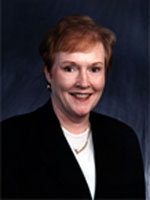 Ann Jorgensen
Ann Jorgensen
Member
May 27, 1997, to November 25, 2002Ann Jorgensen was appointed to the FCA board by President William J. Clinton. She was elected to serve in January 2000 as chairman of the board of directors of the Farm Credit System Insurance Corporation, the first woman in that capacity.
Ms. Jorgensen brought to her position on the FCA board extensive experience in production agriculture and accounting. She started farming in partnership with her husband in 1963. Their farm now includes a cropping operation (Jorg-Anna Farms) and a hog operation (Timberlane Hogs Ltd).
Ms. Jorgensen also worked as a tax accountant for 10 years and as a licensed commodity broker for seven years. In 1981, she started Farm Home Offices, a mail-order catalog company, which markets farm management products designed to help farmers improve their financial and production management systems.
Ms. Jorgensen served on a number of governing boards for the State of Iowa, including the Board of Regents for six years. The Board of Regents is responsible for the state’s three universities, including the University of Iowa Hospital, which is a world-renowned teaching hospital, and its affiliated clinics.
She also served as a board member for the Iowa Department of Economic Development and as chair of the Iowa Rural Development Council. Among the many other boards and committees she served on were
- the Agriculture Product Advisory Board,
- the Interstate Agricultural Grain Marketing Commission,
- the Iowa Supreme Court Study Commission for the 21st Century,
- the National Pork Producers Council Environmental Committee,
- the Iowa State University President’s Council,
- the European Trade Task Force Legislative Study Committee, and
- the Iowa Public Broadcasting Network Board of Directors and Foundation Board.
Ms. Jorgensen is a coauthor of a producer’s guide, “The Farmer’s Guide to Total Resource Management,” and the author of a book, "Put Paperwork in Its Place" She also writes for, and serves as an expert resource person, for several farm publications.
In 1997, she was one of the national agricultural leaders named by Alpha Zeta, the national honorary agricultural fraternity, to its Centennial Honor Roll. She was honored as the Outstanding Young Woman for the State of Iowa in 1976 and was inducted into the Iowa Volunteer Hall of Fame in 1989. Ms. Jorgensen and her husband were recognized by "Farm Futures" magazine in 1983 as the owners of one of the Top 10 Best Managed Farms.
Ms. Jorgensen, a native of Iowa, holds a Bachelor of Arts from the University of Iowa. She, her husband, and a son continue to operate their farm in Iowa.
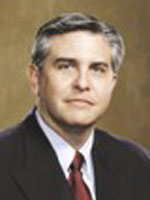 Michael M. Reyna
Michael M. Reyna
Chairman and Chief Executive Officer
January 13, 2000, to December 1, 2004
Member
October 22, 1998, to January 12, 2000Michael Reyna was appointed to the FCA board by President William J. Clinton. He was designated chairman and chief executive officer by President Clinton on January 13, 2000, after the death of Marsha Pyle Martin.
Mr. Reyna instituted numerous programs to increase workplace diversity at FCA. Under his leadership, FCA instituted an Affirmative Employment Program Action Plan to increase the number of minorities, women, and people with disabilities in the FCA workforce. During his tenure, a Blacks in Government chapter was created at FCA, as well as a Female Examiners Work Group. Mr. Reyna instituted a policy prohibiting harassment and provided training to ensure a harassment-free workplace. He also substantially increased work-life balance benefits for FCA employees, which garnered the Office of Personnel Management Award for Outstanding Work-Life Programs.
As chairman, he pursued a far-reaching agenda to reduce regulatory burden, encourage partnerships between System and non-System lenders, broaden investment authorities, strengthen capital levels, improve disclosure, and enhance System board governance and accountability. He oversaw the adoption and implementation of the agency's first-ever performance-based, mission-oriented regulation and held public hearings on proposed regulations to increase the transparency of FCA rulemaking.
Before his appointment to the FCA board, Mr. Reyna served as President Clinton’s director of USDA Rural Development (formerly known as the Farmers Home Administration) in California from November 1993 to October 1998. In that role, Mr. Reyna was responsible for growing and managing a diversified portfolio of housing, business, and infrastructure loans totaling more than $2.6 billion. His work in California on behalf of the Clinton administration included the Northwest Economic Adjustment Initiative, the Rural Empowerment Zone–Enterprise Community program, the AmeriCorps program, and several Reinventing Government initiatives.
Before joining the Clinton administration, Mr. Reyna served for 11 years as a principal advisor to the California legislature, working on financial service industry regulation and a wide range of issues, including housing, economic development, local government finance, and political reform. He was an appointed member of several local commissions, including the Sacramento City Planning Commission, which he served as chairman in 1993. In addition, he was a founding board member of Meadowview Community Action, a local nonprofit agency.
In Texas, he served as a private consultant to the Texas 2000 Project, an initiative of the Governor’s Office of Budget and Planning. In that capacity, he developed and implemented a computer-based simulation model of the Texas economy, which estimated employment and population trends through the year 2000.
In 1996, Mr. Reyna received Vice President Al Gore’s Hammer Award for helping to reinvent the USDA Rural Development Business and Industry Loan Guarantee Program. In 1998 and 1999, he received awards from the California Rural Builders’ Council, the Rural California Housing Corporation, the California Coalition for Rural Housing, and the Valley Small Business Corporation in recognition of his leadership and commitment to rural America. In 2003, he was honored with the LBJ School Alumni Association’s Distinguished Public Service Award. He was also acknowledged by the California legislature for his many contributions while on staff.
Mr. Reyna, a native of Texas, holds a bachelor’s degree in business administration from the University of Texas at Austin and a master’s degree in public policy and administration from the LBJ School of Public Affairs at the University of Texas.
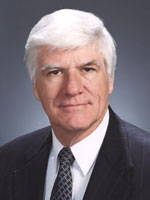 Michael V. Dunn
Michael V. Dunn
Member
December 21, 2000, to January 12, 2001Michael Dunn served briefly as an FCA board member before serving in another capacity with FCA as director of what was then the Office of Policy and Analysis. In that position, he managed the two divisions responsible for developing regulations and public policy positions for FCA.
Before his service with FCA, Mr. Dunn was under secretary of agriculture for Marketing and Regulatory Programs, acting under secretary for rural economic and community development, and administrator of the Farmers Home Administration at the U.S. Department of Agriculture. At USDA, Mr. Dunn also served as a member of the Commodity Credit Corporation and Rural Telephone Bank board.
His career in agricultural credit dates back to the late 1970s, when he was the Midwest Area director for the Farmers Home Administration. He was a loan officer and vice president of the Farm Credit Bank of Omaha and served as a staff member of the Senate Agriculture Committee.
Currently, Mr. Dunn is a Commissioner of the Commodity Futures Trading Commission. He was sworn in on December 6, 2004, to a term expiring June 19, 2006, and was appointed by President George W. Bush to a second term. He serves as chairman and designated federal official of the Commission’s Agricultural Advisory Committee. Mr. Dunn also is chairman of the Commission’s Forex [foreign currency] Task Force.
A native of Keokuk, Iowa, Mr. Dunn was a member of the Iowa Development Commission and served as chairman of the State of Iowa’s City Development Board. He received a B.A. and an M.A. from the University of New Mexico.
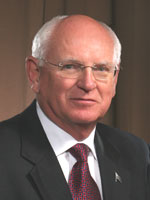 Douglas L. Flory
Douglas L. Flory
Member
August 2, 2002, to December 13, 2006Douglas Flory was appointed to the FCA board by President George W. Bush. In December 2002, he was elected chairman of the board of directors of the Farm Credit System Insurance Corporation.
Mr. Flory brought to his position on the FCA board extensive experience in production agriculture, agribusiness, and commercial bank and Farm Credit System lending. He operates Bunker Hill Farm and is also 50 percent owner of S&F, LLC, a beef, turkey, grain, and hay farm in Augusta County, Virginia.
Before his appointment to the board, Mr. Flory was a member of the board of directors of AgFirst Farm Credit Bank in Columbia, South Carolina, and a director of Farm Credit of the Virginias, ACA, in Staunton, Virginia. He also served as a member of the Farmer Mac Appraisal Standards Committee.
He was executive vice president of Dominion Bank from 1971 to 1988 and was president, chief executive officer, and director of Dominion Farm Loan Corporation. During his banking career, he chaired the Virginia Bankers Association Committee on Agriculture and was a member of the executive committee of the American Bankers Association’s agricultural division.
From 1989 to 1992 he was executive vice president, chief operating officer, and a member of the board of WLR Foods, Inc., a publicly traded poultry food company (now part of Pilgrims Pride).
Mr. Flory also served on several governing boards for the Commonwealth of Virginia. He was appointed to the Virginia Agricultural Council, an advisory board, and the Virginia Agriculture Credit Committee, which he chaired. He also served on the Virginia Agricultural Development Authority, which uses “aggie bonds” to finance Virginia farmers.
Throughout his career, Mr. Flory has been an active participant in agriculture industry associations. He served as president of the Virginia Turkey Association and as president and director of the Rockingham County Fair Association. He also served as a director of the Virginia Poultry Federation, the Virginia Agribusiness Council, the Virginia Beef Cattle Association, and the Virginia Sheep Association.
A native of Augusta County, Virginia, he attended Bridgewater College and earned a bachelor’s degree from Virginia Tech. He did graduate work at James Madison University and is a graduate of the University of Maryland–Virginia School of Bank Management at the University of Virginia.
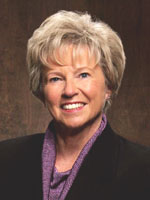 Nancy C. Pellett
Nancy C. Pellett
Chairman and Chief Executive Officer
May 22, 2004, to May 21, 2008
Member
November 26, 2002, to May 21, 2004
May 22, 2008, to March 27, 2010Nancy C. Pellett was appointed to a six-year term on the FCA board by President George W. Bush on November 26, 2002. She served as chairman of the board and chief executive officer of FCA from May 22, 2004, until her term expired on May 21, 2008. She continued to serve as member of the board until March 27, 2010, when her successor was appointed.
Ms. Pellett also served as chairman of the Farm Credit System Insurance Corporation from June 4, 2008, to November 3, 2009.
Ms. Pellett brought to her position on the FCA board extensive experience in production agriculture and agribusiness. In partnership with her husband, she managed Prairie Hills, Ltd., a feedlot, cow-calf, and row-crop operation in Atlantic, Iowa, from 1966 until her appointment to the board. While she served her term as FCA chairman and CEO, her husband, son, and daughter-in-law continued to operate this fifth-generation family farm.
For more than 20 years, she also served as president and treasurer of Fredrechsen Farms, Ltd., a family-owned swine and row-crop operation in Walnut, Iowa.
A long-time beef industry leader, Ms. Pellett held state and national leadership positions in cattle industry organizations. As a member of the National Cattlemen's Beef Association, she served as chairman of the Check-Off Division, as chairman of the Consumer Marketing Group, and most recently as a member of the Cattlemen's Beef Board. She also was president of the Iowa Beef Industry Council.
She is a partner in Premium Quality Foods, Inc., which markets precooked beef entrees. Previously, she served as president and consumer marketing director for the company.
Ms. Pellett served a six-year term as a member of the Board of Regents for the State of Iowa, which oversees the three state universities as well as the University of Iowa Hospital and its affiliated clinics. She was also selected as a member of the Governor's Student Aid Commission.
Dedicated to the future of agriculture, Ms. Pellett worked with 4-H at the local and state levels and served on the Iowa 4-H Foundation board. She is a founding member of the 4-H/FFA Sale of Champions Committee for the Iowa State Fair.
Ms. Pellett is on the Iowa State University Foundation Board of Governors and was a member of the advisory committees for the College of Agriculture and the College of Family and Consumer Sciences. She is past president of the university’s Alumni Association and was awarded the Alumni Medal in 1987. The Pellett family was honored as the Family of the Year by the university in 1997.
The Pellett family also received the Friends of Youth Award in 2000 from the Knights of AkSarBen, a foundation that supports education, youth programs, and rural development in Nebraska and western Iowa.
A native of Walnut, Iowa, Ms. Pellett holds a Bachelor of Science from Iowa State University at Ames. She and her husband have four children.
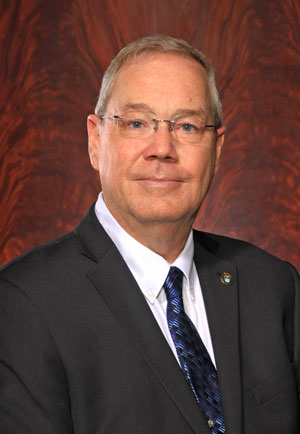 Dallas P. Tonsager
Dallas P. Tonsager
Member
December 2, 2004, to May 17, 2009See biography below, under second entry for Mr. Tonsager.
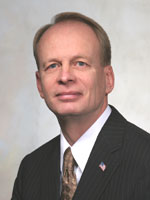 Leland A. Strom
Leland A. Strom
Chairman and Chief Executive Officer
May 22, 2008, to November 27, 2012
Member
December 12, 2006, to May 21, 2008
November 28, 2012, to March 13, 2015Leland A. Strom was appointed to the Farm Credit Administration board by President George W. Bush on December 12, 2006. He served as chairman and chief executive officer from May 22, 2008, until the designation of his successor on November 27, 2012. His statutory term expired on October 13, 2012; however, he continued to serve as a member of the board until his successor was appointed.
Mr. Strom also served as a member of the board of directors of the Farm Credit System Insurance Corporation (FCSIC). From December 2006 until he was named FCA chairman and CEO, he served as chairman of the FCSIC board of directors.
For more than 35 years he has been active in the agriculture industry. He served for more than 25 years on the board of 1st Farm Credit Services, a Farm Credit System institution in Illinois, holding various positions, including chairman. During the agriculture crisis of the 1980s, he was selected to serve on the Restructuring Task Force of the Sixth Farm Credit District.
From 2000 to 2006, he served on the Federal Reserve Bank of Chicago Advisory Council on Agriculture, Labor, and Small Business. He also served on the Country Mutual Fund Trust Board, an investment fund of the Illinois Farm Bureau and its Country Financial organization.
Other boards Mr. Strom has served on include Northern F.S., Inc., a farm service and supply cooperative in Northern Illinois; AgriBank, FCB; and the Farm Credit Council, the national trade organization representing the Farm Credit System in government affairs.
Mr. Strom has served in several capacities with the Illinois Farm Bureau and was a member of the Illinois Ag Leadership Program class of 1988.
In his community of Kane County, Illinois, which lies at the edge of suburban Chicago, Mr. Strom helped develop a farmland preservation program. The original Strom Family Farm was the first to be dedicated to permanent agricultural use under the program.
In 2011, Mr. Strom received the Honorary Doctorate of Humane Letters from Northern Illinois University for his commitment to sustaining agricultural systems and food security. He studied agriculture business at Kishwaukee College and business administration at Northern Illinois University. He attended the Harvard Kennedy School Executive Leadership program and the Harvard Business School Agribusiness Seminar.
His community involvement includes having served as vice president of his local K–12 school district, chairman of his church council, 4-H parent leader, and coach of boys’ and girls’ sports teams. Mr. Strom owns a fourth-generation family farm in Illinois that produces corn and soybeans. He and his wife, Twyla, have three children and two grandchildren.
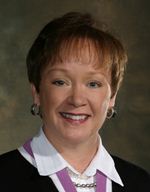 Jill Long Thompson
Jill Long Thompson
Chair and Chief Executive Officer
November 27, 2012, to March 12, 2015
Member
March 27, 2010, to November 26, 2012Dr. Jill Long Thompson was appointed to the FCA board by President Barack Obama in March 2010 and was designated board chair and chief executive officer on November 27, 2012. She also served as a member of the board of directors of the Farm Credit System Insurance Corporation.
As head of FCA, Dr. Long Thompson oversaw the agency’s ethics program. Her goal was to ensure that the agency adheres to the highest ethical standards in carrying out its mission as the arm’s-length regulator of the Farm Credit System. For more information, see Ethics and Arm’s-Length Role.
Dr. Long Thompson was also a strong advocate for diversity and inclusion. In 2012, the FCA board adopted a diversity and inclusion regulation to encourage System institutions to reach out to all eligible, creditworthy producers in their lending territories, including members of underserved groups such as women and minorities. Under her leadership as board chair, the agency emphasized compliance with this rule.
In addition, during her term as board chair, the FCA board issued a policy statement on its commitment to equal employment opportunity and diversity. Through leadership training programs and monthly presentations on a host of diversity-related issues, she stressed the importance of diversity and inclusion among FCA staff.
Dr. Long Thompson has many years of leadership experience. From 1989 to 1995, she represented northeast Indiana as a member of the U.S. House of Representatives, serving on the Committee on Agriculture, the Committee on Veterans’ Affairs, and the Select Committee on Hunger. She also served as Chair of the Rural Caucus.
As a member of the U.S. House of Representatives, she introduced one of the nation’s first pieces of legislation banning members of Congress from accepting gifts; this legislation also expanded disclosure requirements for lobbying activities.
From 1995 to 2001, she served as under secretary for rural development in the U.S. Department of Agriculture, where she oversaw an annual budget of $10 billion and three agencies comprising 7,000 employees. In this position, she managed programs that provide services to the underserved areas of rural America.
In addition, Dr. Long Thompson served as chief executive officer and senior fellow at the National Center for Food and Agricultural Policy, a nonprofit research and policy organization in Washington, D.C.
The first and only woman nominated by a major party to run for governor of Indiana, Dr. Long Thompson is also the first and only Hoosier woman to be nominated by a major party to run for the U.S. Senate.
Dr. Long Thompson also has many years of experience as an educator, having taught at Indiana University, Valparaiso University, and Manchester College. She is also a former fellow at the Institute of Politics at Harvard University’s John F. Kennedy School of Government. She holds a Master of Business Administration and a doctorate in business from the Kelley School of Business at Indiana University and a Bachelor of Science in business administration from Valparaiso University.
Dr. Long Thompson grew up on a family farm outside of Larwill, Indiana; today she resides with her husband, Don Thompson, on a farm near Argos, Indiana.
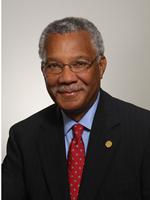 Kenneth A. Spearman
Kenneth A. Spearman
Chairman and Chief Executive Officer
March 13, 2015, to November 21, 2016
Member
October 8, 2009, to March 12, 2015
November 22, 2016, to March 27, 2017Kenneth A. Spearman was appointed to the FCA board by President Barack Obama on October 13, 2009. He was appointed to the balance of Dallas Tonsager’s term and reappointed to a full six-year term. He served as chairman and chief executive officer from March 13, 2015, until the designation of his successor on November 22, 2016. His statutory term expired on May 21, 2016; however, he continued to serve as a member of the board until his death on March 27, 2017.
From October 2009 until March 2015, he also served as chairman of the board of directors of the Farm Credit System Insurance Corporation, which is responsible for ensuring the timely payment of principal and interest on obligations issued on behalf of Farm Credit System banks. After his term expired, he continued to serve concurrently as a member of the FCSIC board of directors.
Mr. Spearman brought to his position on the FCA board many years of experience in finance, agriculture, and agricultural cooperatives. He spent 28 years in the citrus industry. From 1980 to 1991, he was controller of Citrus Central, a $100 million cooperative in Orlando, Florida, where he was responsible for financial management and reporting and the supervision of staff accountants.
He later served as director of internal audit for Florida’s Natural Growers, where he designed and implemented the annual plan for reviewing and appraising the soundness, adequacy, and application of accounting, financial, and other operating internal controls.
From January 2006 until his appointment to the FCA board, Mr. Spearman served as an independently appointed outside director on the AgFirst Farm Credit Bank board in Columbia, South Carolina. During his tenure, he served on the board compensation committee and the board governance committee.Before entering agriculture in central Florida, Mr. Spearman served with the U.S. Army and was a Vietnam veteran. He later was employed by the public accounting firm Arthur Andersen & Co. and was involved with the development of a public accounting firm in Chicago, Illinois. He served as chairman of the board of trustees for the Lake Wales Medical Center. He was a member of the Institute of Internal Auditors, as well as the National Society of Accountants for Cooperatives, where he served a term as national president.
He obtained his master’s degree in business administration from Governors State University in University Park, Illinois, and his Bachelor of Science in accounting from Indiana University. He also attended Harvard Kennedy School Executive Education, where he completed a program with a concentration in Government Agency Strategic Planning.
Mr. Spearman is survived by his wife, Maria, and three children — twin daughters, Michelle Springs and Rochelle Puccia, and a son, Dr. Kenneth Spearman; and four granddaughters.
 Dallas P. Tonsager
Dallas P. Tonsager
Chairman and CEO
November 22, 2016, to May 21, 2019
Member
March 13, 2015, to November 21, 2016Dallas P. Tonsager was appointed to the Farm Credit Administration board by President Barack Obama on March 13, 2015. He was designated chairman and CEO by President Obama on November 22, 2016. He died in office.
Mr. Tonsager brought to his position on the FCA board extensive experience as an agriculture leader and producer, and a commitment to promoting and implementing innovative development strategies to benefit rural residents and their communities.
Mr. Tonsager served as under secretary for rural development at the U.S. Department of Agriculture (USDA) from 2009 to 2013. In this position, he expanded broadband communication in rural America and implemented other key elements of the Recovery Act for rural America. He dramatically expanded USDA's water and wastewater programs, expanded funding for first- and second-generation biofuels, and funded hospitals and other public facilities in rural America. He also worked with the Farm Credit System and others to set up new venture capital investment funds.
From 2010 to 2013, he was a member of the Commodity Credit Corporation board of directors. From 2004 to 2009, Mr. Tonsager served as a member of the FCA board, as well as a member of the FCSIC board of directors.
From 2002 to 2004, he was the executive director of the South Dakota Value-Added Agriculture Development Center. In this position, he coordinated initiatives to better serve producers interested in developing value-added agricultural projects. Services provided by the center include project facilitation, feasibility studies, business planning, market assessment, technical assistance, and education.
In 1993, he was selected by President William J. Clinton to serve as USDA's state director for rural development in South Dakota. Mr. Tonsager oversaw a diversified portfolio of housing, business, and infrastructure loans in South Dakota. His term ended in February 2001.
A longtime member of the South Dakota Farmers Union, Mr. Tonsager served two terms as president of the organization from 1988 to 1993. During that same period, he was a board member of Green Thumb Inc., a nationwide job training program for senior citizens. In addition, he served on the board of National Farmers Union Insurance from 1989 to 1993, and he was a member of the advisory board of the Commodity Futures Trading Commission from 1990 to 1993.
Mr. Tonsager grew up on a dairy farm near Oldham, South Dakota. For many years, he and his older brother owned Plainview Farm in Oldham, a family farm on which they raised corn, soybeans, wheat, and hay. He was a graduate of South Dakota State University where he earned a Bachelor of Science in agriculture in 1976.
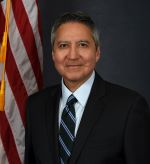 Vincent G. Logan
Vincent G. Logan
Chairman and CEO
October 21, 2022, to January 20, 2025
Member
October 3, 2022, to October 20, 2022
January 20, 2025, to March 31, 2025Vincent G. Logan was appointed to the FCA board by President Joseph Biden on October 3, 2022. He served as board chairman and CEO from October 21, 2022, until January 20, 2025. Mr. Logan was the first openly gay person to serve on the FCA board; as a member of the Osage Nation, he was also the first Native American.
Mr. Logan was also a member of the board of directors of the Farm Credit System Insurance Corporation, an independent U.S. government-controlled corporation that insures the timely payment of principal and interest on obligations issued jointly by Farm Credit System banks.
Prior to joining FCA, Mr. Logan was chief financial officer and chief investment officer for the Native American Agriculture Fund, which is the largest philanthropic organization dedicated solely to serving the Native American farming and ranching community.
Nominated by President Barack Obama and confirmed by the U.S. Senate in 2014, Mr. Logan served as the Special Trustee for American Indians at the U.S. Department of the Interior. During his tenure, he was appointed to the Department of the Treasury’s Financial Literacy Education Commission, which seeks to develop a national strategy on financial education.
Mr. Logan worked in New York both as a lawyer, practicing in aircraft, shipping, and equipment finance, and as an investment advisor, focusing on institutional asset management and permanent fund development.
Mr. Logan previously served as a director to the Federal Reserve Bank of St. Louis, Little Rock Branch, and as an Oklahoma State University Foundation governor. He was educated at Oklahoma State University; the University of Oklahoma College of Law; Queen’s College, Oxford University; and the School of International and Public Affairs at Columbia University.

